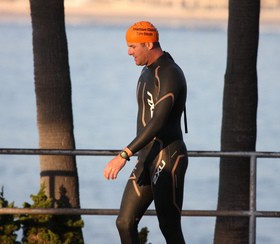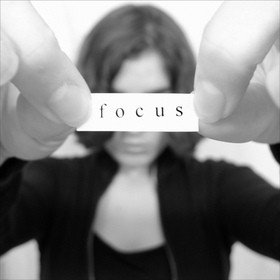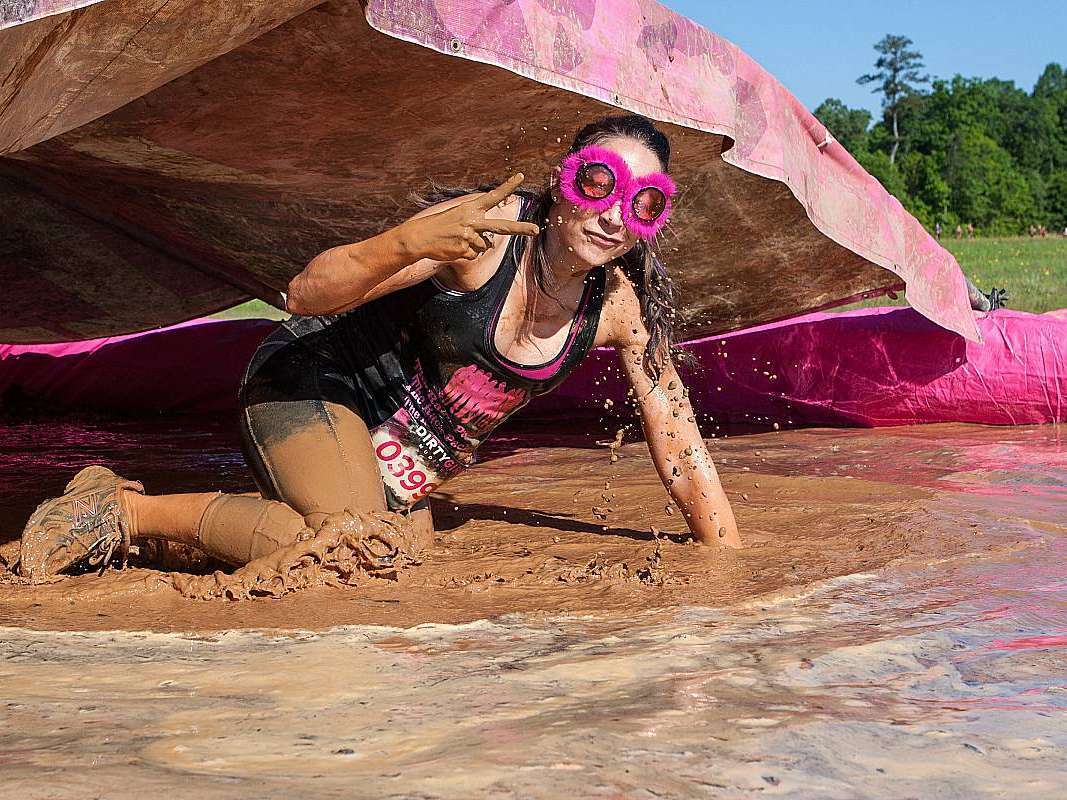 One of the most significant mental or psychological disruptions for a triathlete is anxiety.
One of the most significant mental or psychological disruptions for a triathlete is anxiety.
Some common triathlete anxieties include:
- A newbie’s anxiety in their first triathlon
- Common pre-race jitters or nerves
- Anxiety associated with open-water swimming
- Fear of not making your split times in a race
- General doubts about level of readiness
- Anxiety caused by the unexpected or gear malfunction
Triathlon Anxiety
The sport of triathlon lends itself to anxiety for a few different reasons.
Here are 2 of them…
#1 – Replicating Race Conditions
First, it’s very difficult to replicate race conditions in triathlon training.
If you train by yourself or with a partner or two, this is not the same as what happens in actual competition. A nice, calm open-water training swim with a couple tri friends is not the same as the mayhem of the typical triathlon swim, especially the start.
Even without the mayhem, there’s normally a higher level of anxiety associated with performing in competition even if you’ve shown you can do it in training. This pretty much applies to all sports. You can make 20 consecutive free-throws in practice, but it is different standing on the free-throw line when there’s 6 seconds left and you are down by one point.
#2 – Abundance Of Triathlete Gear
Another stress area in the sport of triathlon involves the abundance of gear.
If you are a marathon runner, you have very little gear and no concerns of gear malfunction. The triathlete, on the other hand, has a multitude of gear items to keep track of, tote around, unpack, adjust, and assure proper functioning.
The gear issue alone can be a source of anxiety and stress on race day. You’ve already experienced this if you’ve ever misplaced or forgotten a gear item on race day, had a flat tire during the race, or needed that extra pair of goggles you never bothered purchasing.
Effects Of Anxiety On Athletic Performance
Certain types of athletes are more prone to feeling the effects of anxiety on performance.
Amateur or newbie triathletes are more likely than experienced or professional triathletes to experience anxiety that interferes with their ability to perform in competition. This makes sense, due to their relative lack of experience both in competition and in managing arousal. Athletes who participate in individual sports have also been found to experience more anxiety than those who play team sports. Logic tells you that being part of a team alleviates some of the pressure experienced by those who compete alone.
When the rush of adrenaline is interpreted as anxiety, and negative thoughts begin to swirl, it can have devastating effects on your ability to perform as a triathlete. The coordinated movement required for swimming, biking, and running becomes increasingly difficult when your body is in a tense state.
A certain level of physical arousal is useful and prepares or helps a person for competition. But when the physical symptoms of anxiety (muscle tension, shortness of breath, racing heart, dry mouth, disorientation, etc.) are too severe, they may seriously interfere with your ability to compete. In some cases, it can escalate into a full-blown panic attack.
Likewise, a certain amount of anxiety about how you perform can be helpful in competition, but severe symptoms of anxiety such as negative thought patterns and expectations of failure can bring about a self-fulfilling prophecy. As mentioned above, if there is a substantial difference between how you perform during practice and how you do during competitions, anxiety is probably affecting your performance.
Signs that signal that anxiety may be affecting your triathlon performance:
- Extreme nerves during competition
- Lack of belief in yourself
- Great in training, but terrible in competition
- Training hard but getting little payback
- Injuries or illnesses occurring just before competitions
- Slumps in form
- Regularly recurring problems in competition
- Concentration and technical problems
- Doubts, fears, worries and anxiety, worrying about what others think
- Inconsistency in competition performances
- Overly worrying about the “uncontrollables”
- Feeling sick on the day of the triathlon
How Self-Confidence Affects Anxiety
Research shows that self-confidence plays a huge role in how you respond to symptoms of anxiety during athletic performance.
People who are confident in their abilities have a positive reaction to arousal and anxiety and thrive on the challenge of competition. When confidence is strong, it tends to crowd worry out of the mind.
The short answer to overcoming triathlon anxiety is to build self-confidence. That’s the best preventive measure for reducing triathlon stress.
Tips For Managing Race Day Anxiety
There are also several strategies for managing race-day anxiety.
Here are 2 to consider…
#1 – Visualize a successful triathlon performance.
 Visualization is the simple act of mentally imagining yourself performing at your peak level. Proponents of visualization believe this establishes a mental blueprint within the subconscious for your body to follow when you are competing.
Visualization is the simple act of mentally imagining yourself performing at your peak level. Proponents of visualization believe this establishes a mental blueprint within the subconscious for your body to follow when you are competing.
Visualization involves quieting your thoughts, relaxing your mind, and allowing the video of your successful triathlon performance run through your mind. It’s seeing yourself locked into that fluid rhythm on your swim, a steady and strong performance on the bike, and reaching deep for a focused and fearless run.
One way people do this is by remembering specific instances when they were aware of swimming and biking and running at peak-level performance. Then, it’s a matter of combining the memories of these three separate instances into one unified visualization of how you will perform in your triathlon. Close your eyes and join all those segments together in your mind — like putting together a jigsaw puzzle of film and video clips. Put them all together as one race, and this is now the movie of you at your absolute best!
Most people who incorporate visualization into the mental side of their triathlon training practice this discipline regularly.
#2 – Practice positive self-talk.
Humans think approximately 60,000 thoughts a day. Your thoughts are an internal dialogue with yourself and play a critical role in influencing your response to certain situations. Something happens, you mull it over internally, and then you respond with an action. The event in and of itself did not determine your response; it’s your interpretation of the event that determined your response.
When you’re mulling over a particular situation, your thoughts are either slanting in a positive or a negative direction. Research shows that your performance is affected by the nature and content of self-talk prior to and during competition. Positive self-talk can help enhance your performance. Negative self-talk is counterproductive, leads to self-doubt, and can cause poor performance.
How To Overcome Negative Thoughts
 Let’s say the weather conditions on race day aren’t so great for your triathlon and you start thinking after you get your first glance at the lake, “There is no way I’m going to be able to swim well in that choppy water.” You fixate on the thought, anxiety escalates, and by the time you put your toe in the water you are a nervous wreck and the physical anxiety symptoms are manifesting. You’re defeated before you even start!
Let’s say the weather conditions on race day aren’t so great for your triathlon and you start thinking after you get your first glance at the lake, “There is no way I’m going to be able to swim well in that choppy water.” You fixate on the thought, anxiety escalates, and by the time you put your toe in the water you are a nervous wreck and the physical anxiety symptoms are manifesting. You’re defeated before you even start!
Or let’s say during a competition you began thinking something like, “Hmm…I feel like I’m getting tired a lot earlier than normal today.” So, for the next 10 minutes, you continue to dwell on that thought. The result of that negative self-talk can begin to sap your body’s energy by programming your mental state with the “I feel tired” program.
It’s possible your mind may be in a quiet and relaxed state while you’re competing. This would likely be a good sign, as this generally means that you are in that “zone” where you feel free and connected to the moment. Realistically however, most often your mind will chatter away to you while you are competing. Most of this is completely harmless — except when it fixes itself upon a particular negative thought, such as a specific pain, tiredness, the level of difficulty you are experiencing with the particular segment you are on, etc. Then… it’s “Houston we have a problem!”
You may not even be aware of your own self-talk, so the first step is awareness. What do you say when you talk to yourself? When it’s time to train or race, what thoughts pop into your mind? Being aware of negative self-talk is the first step toward changing it.
Consider developing your own personal “sport language.” What would you say if you were coaching yourself through a competition? Rather than complete sentences, this language could include positive one-word affirmations or short phrases. Letting negative thoughts control your performance is a tough habit to break, but with practice it can be done.
One of the best ways to overcome negative thoughts before a race is to re-focus the mind onto something positive by using a short and simple affirmation. One technique is to simply repeat a few positive, powerful words over and over again for 5-10 minutes before a race. This does 2 things: it focuses the mind onto the positive, and it prevents negative thoughts being “programmed in” before the race. These can even be used during your triathlon, especially the run leg.
Every triathlon is a battle between your self-confidence and your own mental resistance. A victory or a great time is a triumph of your self-confidence over doubt. Every triathlete has their own wall of resistance they must personally scale before they can succeed and perform at their best.
Consider leaving a comment about ways you learned to overcome that wall of resistance for yourself.



